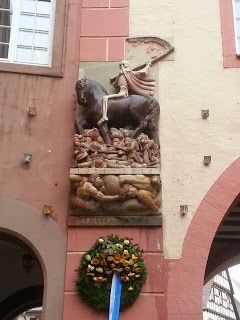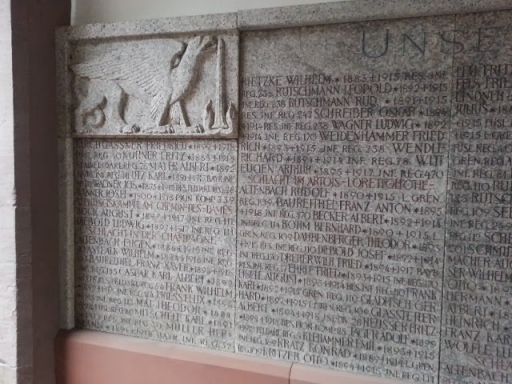Stories of soldiers from a small town in Germany who fought in the First World War are being rediscovered by a website that draws on a wealth of documents and photographs stored in the local archives.
The experiences of the men who went to war from Ettlingen, near the city of Karlsruhe, emerge vividly in the letters and diaries they wrote on both the Western and Eastern Fronts.
Many can now be read on Ettlingen’s First World War Commemoration website, set up last year by Katherine Quinlan-Flatter, a British-born software consultant who lives in the town.
Katherine told Centenary News: “I wanted to honour the German soldiers who were never really honoured because of all the chaos that followed the First World War and led to the Second World War.”
“The site is primarily for the people of Ettlingen, but of course we are interested in reaching out globally as the material is so interesting and also provides insights into social history as well as personal history, so that is why it’s in English.”
“I also wanted to present the Germans, especially to the British, as people. I specifically talk about them with their first names. They were people just like you, not the Hun.”
Katherine Quinlan-Flatter explains that she’s working closely with the local municipal archive (Stadtarchiv Ettinglen), which holds a wealth of letters sent by soldiers from the frontline and is the source for much of the website’s material.
Perfectly preserved
The correspondence has been perfectly preserved for 100 years. Some of the letters are still in their original envelopes, often lined with tissue paper.
The stories emerging week by week include an account of a mother’s tearful but composed reaction to the news that her son had become Ettinglen’s first fatal casualty of the war in August 1914.
Yet even then, as the German armies advanced across northern France, there was a note of caution. The editor of the local paper, Dr Richard Barth, used his War Diary to criticise the impatience of a local population which “craves the news of new battles, new successes and great victories every day and never stops to think how our brothers bleed in the fields”.
Most of the letters in the Stadtarchiv Ettlingen belong to a collection donated by a family named Kiefer. Oskar Kiefer, a sculptor, designed the highly unusual memorial to the dead of the Great War on the town hall tower in Ettlingen (below).

Created in 1927, the skeleton on horseback, riding above the the bodies of the dead and the dying, was Germany’s first “anti-war memorial.” It was uncommon at the time as war had previously been considered a noble and necessary activity.
Oskar’s brother, Theodor Kiefer (known as Tor), was a young doctor who served on both the Western and Eastern Fronts. Katherine Quinlan-Flatter describes how this “prolific and gifted writer” sent letters home every few days, often giving detailed descriptions of the wounded.
In a letter from November 1916, Tor tells the extraordinary story of an unofficial ceasefire that took place between German and Russian troops in Galicia, allowing each side to build dugouts and collect supplies, including wood. Tor noted: “As long as we have been at war, nothing like this has ever happened. To put it in a nutshell: there must be peace”.
Around 200 soldiers never came back to Ettlingen. Many more died from the six surrounding villages that now form part of the modern-day town in the western state of Baden-Württemberg. Around 80 soldiers returned from prisoner-of-war camps in 1919 and 1920.
Katherine Quinlan-Flatter dedicates her First World War Commemoration website to all those from Ettlingen who “fought, died, and lost their loved ones in this most tragic of conflicts.”
She says there’s growing interest in the project, both locally and outside Germany: “The Stadtarchiv has also put ads in the local paper calling for people to bring in photos, stories, memorabilia, etc.”
“Sometimes people call me, and sometimes they prefer to bring their things to the archive. I then visit them and do a short interview to get a personal story.”
“People from all over the world have been calling up the site, including from Australia, South Africa, Japan and even Indonesia and China.”
Descendants of veterans of the Great War are invited to contact the site if they would like them to be included. The email address is ettlingenww1@gmail.com
Source: First World War Commemoration Site Ettlingen, Germany
Images courtesy of Katherine Quinlan-Flatter
Posted by Peter Alhadeff, Centenary News
